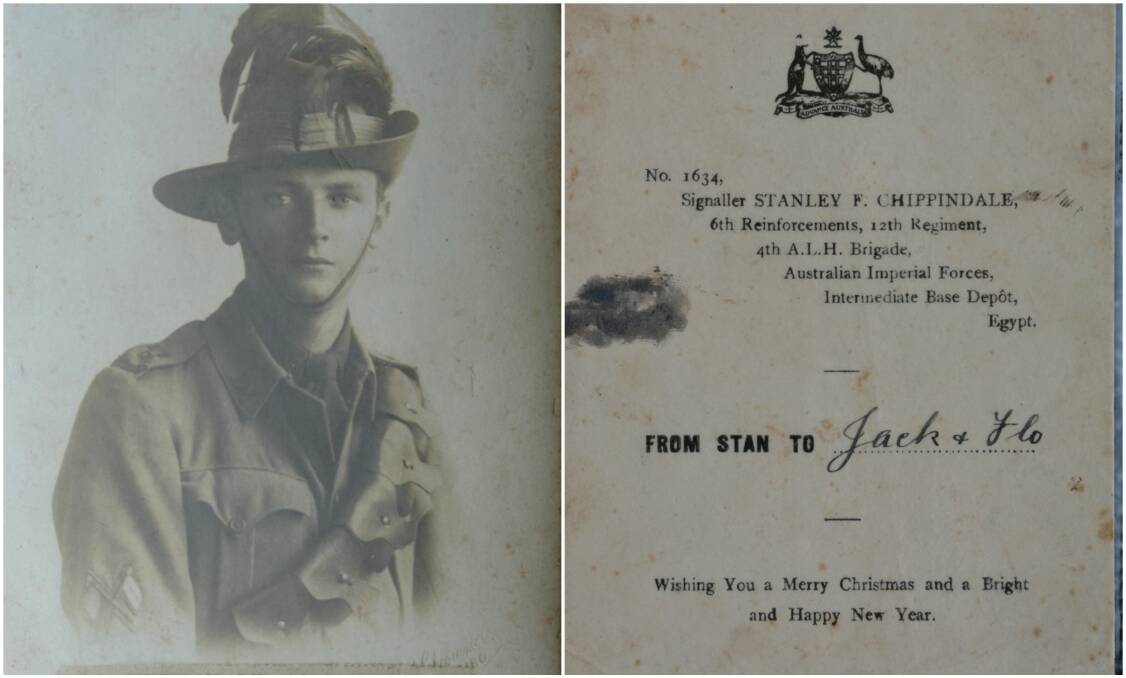
Gloucester’s Ron Cranfield retells the story of how a tobacco tin full to letters and photographs saved his great uncle Bombardier Stanley Chippindale’s life during World War I.
Subscribe now for unlimited access.
Ron was reminded of the story after reading one of the Road to Remembrance stories in the Gloucester Advocate; a 10-part series that explores the bravery of Australian soldiers fighting in France and Belgium.
Stan, as he was known by his family, was 21 years old when he enlisted in August 1915 and was posted to the 12th Light Horse Regiment in Egypt.
On October 2, 1915 he boarded the RMS Moldavia in Sydney.
Ron has the postcard that Stan mailed to his brother and sister-in-law that Christmas Stan had spent in Egypt.
The only handwritten part on the card reads “Jack and Flo” which follows the pre-typed words: “From Stan to”.
The stock standard postcard would have been given to Stan and posted home to Australia for free.
Most letters sent from the front line were read by an officer who checked to make sure it was acceptable to send and didn’t contain anything that might give away army secrets.
Stan only stayed with the Regiment for two months before he transferred to the 25th Brigade Australian Field Artillery in France and began working as a telephone specialist on the front line in France.
The letters and photos Stan received from home were kept in a tobacco tin which was in his pocket when Stan’s brigade came under attack in Petillon, near Fromelles in July 1916.
He was in a trench when a shell exploded and buried him under debris and soil.
After he was freed by the other soldiers, he continued to work, non-stop for 12 hours maintaining communications at the front from 11am until 11pm on July 19, 1916 until he was relieved from his post.
“A bit of shrapnel hit the tin which saved his live and allowed him to continue his work,” Ron explained.
It is recorded that Stan’s priority once freed from the debris was to ensure communication was restored and maintained despite being under very heavy shell and rifle fire. It’s reported that he had to frequently repair broken wire.
Due to his wounds, he was evacuated to Newcastle-upon-Tyne in northern England, where it is recorded that his was healing well until he developed pneumonia.
He died on August 17, 1916 at age 22.
Stan was awarded the Distinguished Conduct Medal (DCM) for his bravery and dedication to service.
He’s buried in the St Andrew's and Jesmond Cemetery in the United Kingdom.
Ron’s mother, Ellen Cranfield was born in 1917 the year after Stan was killed and never knew her uncle.
She ended up with Stan’s tobacco tin, its contents and his medals.
Ron said these have been given to the the Australian War Memorial in Canberra.
As a tribute to all the diggers who died in WWI, the name of each of the 62,000 Australians who gave their lives during the First World War will be projected onto the façade of the Hall of Memory at the Australian War Memorial.
The Roll of Honour runs for the centenary period beginning on August 4, 2014 until November 11, 2018 with every name to displayed about 30 times.
Stanley Francis Chippindale's name already appeared and will be displayed again on:
- Monday 19 March 2018 at 5:33am
- Monday 7 May 2018 at 2:59am
- Tuesday 19 June 2018 at 3:35am


